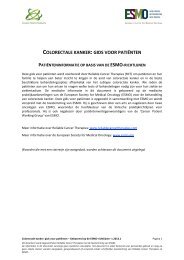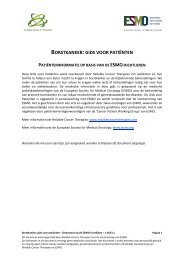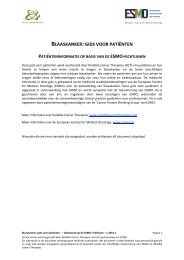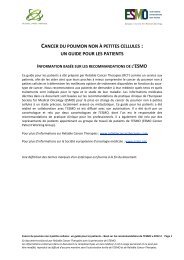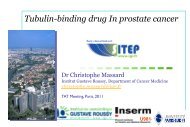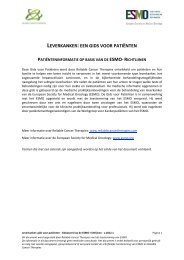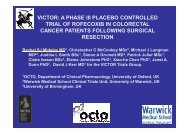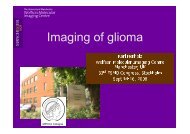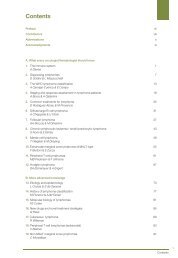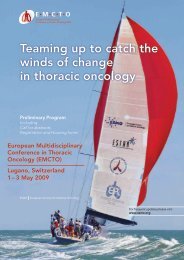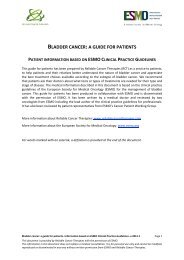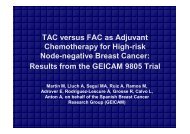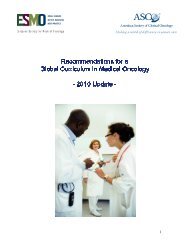Dual therapy shows potential in melanoma - European Society for ...
Dual therapy shows potential in melanoma - European Society for ...
Dual therapy shows potential in melanoma - European Society for ...
Create successful ePaper yourself
Turn your PDF publications into a flip-book with our unique Google optimized e-Paper software.
Sunday 30 September 2012 Congress Daily www.esmo.org Sunday 30 September 2012 Congress Daily www.esmo.org<br />
TODAY’S EDUCATIONAL SESSIONS<br />
Decision mak<strong>in</strong>g & management of glioma:<br />
Practical considerations<br />
09:15 – 10:45 Hall G<br />
Diagnosis and management issues <strong>in</strong><br />
colorectal cancer (Repetition)<br />
11:00 – 12:30 Hall C<br />
Diagnosis and management issues <strong>in</strong><br />
lymphoma<br />
14:15 – 15:45 Hall L-M<br />
Diagnosis and management issues <strong>in</strong><br />
<strong>melanoma</strong> (Repetition)<br />
16:15 – 17:45 Hall F1<br />
Issues <strong>in</strong> sarcoma (Repetition)<br />
14:15 – 15:45 Hall C<br />
Image of the day<br />
esmo membershIp<br />
servICes Center<br />
Located <strong>in</strong> the <strong>Society</strong> Village.<br />
The ESMO Membership Team is available<br />
to answer all your membership needs.<br />
Locally advanced disease: Treatment choice<br />
based on risk factors <strong>in</strong> head and neck<br />
cancer (Repetition)<br />
11:00 – 12:30 Hall F1<br />
Molecular tools <strong>for</strong> decision mak<strong>in</strong>g <strong>in</strong><br />
breast cancers (Repetition)<br />
09:15 – 10:45 Hall C<br />
Towards <strong>in</strong>tegrated management of patients<br />
with carc<strong>in</strong>oma of an unknown primary site<br />
(CUP)<br />
16:15 – 17:45 Hall C<br />
Updates <strong>in</strong> supportive and palliative care<br />
14:15 – 15:45 Hall F1<br />
Improve<br />
your Congress<br />
experIenCe!<br />
esmo membershIp<br />
Lounge<br />
Located on level 1.<br />
An exclusive area <strong>for</strong> ESMO members to get<br />
away from the crowd! Access your email,<br />
meet colleagues and relax between sessions.<br />
We look <strong>for</strong>ward to welcom<strong>in</strong>g you.<br />
Case <strong>for</strong> <strong>in</strong>clud<strong>in</strong>g patients<br />
with bra<strong>in</strong> metastases <strong>in</strong><br />
cl<strong>in</strong>ical trials<br />
The presence of bra<strong>in</strong> metastases should not<br />
preclude patients from be<strong>in</strong>g entered <strong>in</strong>to cl<strong>in</strong>ical<br />
trials, delegates heard <strong>in</strong> the Molecular Neuro-<br />
Oncology Special Symposium yesterday. However,<br />
Professor Michael Brada, from the Royal Marsden<br />
Hospital, London, UK, told the audience that there<br />
was a need <strong>for</strong> subgroup analyses where patients<br />
with bra<strong>in</strong> metastases are analyzed separately<br />
from those with systemic extracranial disease only.<br />
Professor Brada advised that this will be especially<br />
important <strong>in</strong> cl<strong>in</strong>ical trials test<strong>in</strong>g new antimetastatic<br />
agents, otherwise it will be impossible<br />
to provide proof-of-pr<strong>in</strong>cipal <strong>for</strong> the therapeutic<br />
efficacy of these agents <strong>in</strong> the bra<strong>in</strong>.<br />
Traditionally, <strong>in</strong>vestigators have shied away from<br />
recruit<strong>in</strong>g patients with bra<strong>in</strong> metastases <strong>in</strong>to<br />
cl<strong>in</strong>ical trials s<strong>in</strong>ce chemo<strong>therapy</strong> agents are of<br />
limited efficacy due to their <strong>in</strong>ability to cross the<br />
blood bra<strong>in</strong> barrier. However, tumor vasculature<br />
tends to be relatively permeable, as evidenced<br />
by enhancement of lesions with contrast agents.<br />
There<strong>for</strong>e, many chemotherapeutic agents,<br />
although unable to penetrate the blood-bra<strong>in</strong><br />
barrier, may still achieve therapeutic levels where<br />
bra<strong>in</strong> metastases have disrupted the blood bra<strong>in</strong><br />
barrier.<br />
Professor Brada stressed that future cl<strong>in</strong>ical trials<br />
explor<strong>in</strong>g agents <strong>in</strong> bra<strong>in</strong> metastases should focus<br />
on patients <strong>in</strong> whom bra<strong>in</strong> metastases are likely to<br />
be the ma<strong>in</strong> determ<strong>in</strong>ants of outcome and who have<br />
<strong>in</strong>active systemic disease. The issue has been that<br />
many previous trials treat<strong>in</strong>g patients with solitary<br />
bra<strong>in</strong> metastases with chemo<strong>therapy</strong> have not<br />
<strong>in</strong>fluenced survival, suggest<strong>in</strong>g that bra<strong>in</strong> disease<br />
is not the pr<strong>in</strong>cipal determ<strong>in</strong>ant of life expectancy<br />
when patients have dissem<strong>in</strong>ated disease.<br />
Professor Brada concluded that <strong>for</strong> future studies<br />
to have any chance of success, appropriate<br />
patient selection us<strong>in</strong>g enrichment with predictive<br />
biomarkers will also be needed.<br />
esmo.org<br />
ESMO holds first session<br />
dedicated to Community Oncologists<br />
Issues regard<strong>in</strong>g the tailor<strong>in</strong>g of<br />
chemo<strong>therapy</strong> dos<strong>in</strong>g <strong>in</strong> specific<br />
situations, awareness of drug-drug<br />
<strong>in</strong>teractions with chemo<strong>therapy</strong> and<br />
concurrent medications and def<strong>in</strong><strong>in</strong>g<br />
quality <strong>in</strong>dicators <strong>for</strong> oncology practice,<br />
were all raised and discussed dur<strong>in</strong>g the<br />
first ESMO Special Session yesterday.<br />
The ESMO Community Oncology Work<strong>in</strong>g Group<br />
was created <strong>in</strong> 2010 with the aim of represent<strong>in</strong>g<br />
professionals work<strong>in</strong>g outside academic<br />
<strong>in</strong>stitutions or comprehensive cancer centers who<br />
treat patients with a wide range of tumors.<br />
“This work<strong>in</strong>g group believes that cancer care ought<br />
to be of the same quality if delivered <strong>in</strong> an academic<br />
<strong>in</strong>stitution or by an ESMO member oncologist<br />
practis<strong>in</strong>g <strong>in</strong> a community sett<strong>in</strong>g. The group<br />
there<strong>for</strong>e works with ESMO to support practis<strong>in</strong>g<br />
oncologists <strong>in</strong> deliver<strong>in</strong>g the best available care to<br />
their patients,” expla<strong>in</strong>ed Dr Robert Eckert, Chair<br />
of the ESMO Community Oncology Work<strong>in</strong>g Group.<br />
Dr Eckert from We<strong>in</strong>dl<strong>in</strong>gen, Germany, expla<strong>in</strong>ed<br />
that yesterday’s special session ‘Excellence <strong>in</strong><br />
Care and Chemo<strong>therapy</strong>: Goals and Challenges<br />
<strong>for</strong> the Oncology Team’ had been devised <strong>in</strong> direct<br />
response to results from a <strong>European</strong> survey which<br />
showed that community oncologists would like<br />
ESMO conferences to provide education relevant<br />
to their every day practice. Already, ESMO has<br />
implemented a number of measures <strong>for</strong> community<br />
oncologists, <strong>in</strong>clud<strong>in</strong>g OncologyPRO, ESMO’s onl<strong>in</strong>e<br />
education portal, ESMO Cl<strong>in</strong>ical Practice Guidel<strong>in</strong>es<br />
and additions to the ESMO web pages to ensure<br />
the efficient delivery of relevant <strong>in</strong><strong>for</strong>mation to<br />
oncologists everywhere.<br />
Dr Walter Baumann, from the Scientific <strong>in</strong>stitute<br />
of office-based Hematologists and Oncologists,<br />
Cologne, Germany, outl<strong>in</strong>ed the issue of quality<br />
assurance <strong>in</strong> oncology and provided an overview<br />
of the WINHO (Wissenschaftliches Institut der<br />
Niedergelassenen Hämatologen und Onkologen<br />
GmbH) project, that aims to enhance ongo<strong>in</strong>g quality<br />
report<strong>in</strong>g, ensure fair assessment of every outpatient<br />
care unit, consider peer-to-peer benchmark<strong>in</strong>g<br />
and <strong>in</strong>corporate systematic support of practice<br />
quality improvement. Dr Baumann described how<br />
46 quality measures <strong>for</strong> oncology practices have<br />
been def<strong>in</strong>ed from 67 measures selected from the<br />
literature concern<strong>in</strong>g medical oncology treatment<br />
<strong>in</strong> general and treatment of breast and colorectal<br />
cancer <strong>in</strong> particular, with 6 measures used to<br />
pilot data collection. Dr Baumann advised that the<br />
first experience <strong>in</strong> Germany showed that many<br />
oncologists are will<strong>in</strong>g to participate. However,<br />
there are still a number of challenges ahead <strong>for</strong> this<br />
<strong>in</strong>itiative, <strong>in</strong>clud<strong>in</strong>g the need to ensure uni<strong>for</strong>m data<br />
collection <strong>in</strong> a way that does not enlarge bureaucracy<br />
and that can be translated <strong>in</strong>to quality improvements<br />
<strong>in</strong> everyday practice<br />
Professor Carsten Bokeymer from University Cancer<br />
Center, Hamburg, Germany, reviewed the challenge<br />
of identify<strong>in</strong>g the right chemo<strong>therapy</strong> dose <strong>for</strong><br />
the right patient. Dur<strong>in</strong>g his talk, he highlighted<br />
several key patient groups where these issues are<br />
particularly relevant, <strong>in</strong>clud<strong>in</strong>g patients with obesity,<br />
those with renal <strong>in</strong>sufficiency and dialysis patients,<br />
and those with liver dysfunction, and stressed that<br />
although safety data <strong>for</strong> dose modifications are<br />
limited, careful action is always required.<br />
Professor David Kerr, from the Universities of<br />
Ox<strong>for</strong>d and Cornell, addressed the serious issue<br />
of drug-drug <strong>in</strong>teractions. Dur<strong>in</strong>g his talk, he<br />
highlighted key factors predispos<strong>in</strong>g patients to<br />
drug <strong>in</strong>teractions, multiple medications, advanc<strong>in</strong>g<br />
age, compromised liver or kidney function, more<br />
than one prescriber and comorbidities. He warned<br />
that drug <strong>in</strong>teractions can often be overlooked or<br />
even expla<strong>in</strong>ed as poor compliance or progress<strong>in</strong>g<br />
disease, and advised that an improved knowledge<br />
of the drug <strong>in</strong>teraction process, possibly by the<br />
development of a dedicated web-based service,<br />
could aid diagnosis of many cases of unexpla<strong>in</strong>ed<br />
or unexpected responses to drug <strong>therapy</strong>.<br />
F<strong>in</strong>ally, Dr Elizabeth Schnoy, from Regensburg,<br />
Germany, outl<strong>in</strong>ed the pr<strong>in</strong>ciple goals of process<br />
safety <strong>in</strong> chemo<strong>therapy</strong> and explored processes<br />
that could be put <strong>in</strong> place to improve safety <strong>in</strong><br />
terms of both the prescription and adm<strong>in</strong>istration<br />
of chemo<strong>therapy</strong>.<br />
17 th ECCO - 38 th ESMO - 32 nd ESTRO<br />
<strong>European</strong> Cancer Congress<br />
Re<strong>in</strong><strong>for</strong>c<strong>in</strong>g multidiscipl<strong>in</strong>arity<br />
AMSTERDAM, 27 SEPTEMBER - 1 OCTOBER 2013<br />
www.ecco-org.eu<br />
In partnership: SIOP<br />
SIOP Europe<br />
the <strong>European</strong> <strong>Society</strong> <strong>for</strong> Paediatric Oncology<br />
Heat shock prote<strong>in</strong><br />
<strong>in</strong>hibitor <strong>shows</strong><br />
<strong>potential</strong> <strong>in</strong> NSCLC<br />
Ganetespib is a potent <strong>in</strong>hibitor of heat shock<br />
prote<strong>in</strong> 90 (HSP90), a molecular chaperone<br />
required <strong>for</strong> the proper fold<strong>in</strong>g and activation of<br />
many cancer-promot<strong>in</strong>g prote<strong>in</strong>s, that has already<br />
demonstrated s<strong>in</strong>gle-agent activity <strong>in</strong> pre-treated<br />
patients with advanced NSCLC harbor<strong>in</strong>g the<br />
ELM4-ALK rearrangement and KRAS mutations.<br />
Although severe liver or ocular toxicities have<br />
been observed previously with HSP90 <strong>in</strong>hibitors,<br />
<strong>in</strong>vestigators believe that the physicochemical<br />
properties of ganetespib - <strong>in</strong>clud<strong>in</strong>g its smaller<br />
molecular weight, greater potency and lipophilicity,<br />
and the absence of the benzoqu<strong>in</strong>one moiety -<br />
contribute to its improved safety profile.<br />
The GALAXY (Ganetespib Assessment <strong>in</strong> Lung<br />
CANCER with docetaXel) trial has been designed<br />
with two dist<strong>in</strong>ct stages. The first stage was<br />
a randomized, open-label, Phase 2b trial that<br />
enrolled 300 patients with Stage IIIB/IV NSCLC<br />
who had progressed follow<strong>in</strong>g one prior l<strong>in</strong>e of<br />
<strong>therapy</strong>; the goal of this stage of the trail was to<br />
determ<strong>in</strong>e biomarkers predictive of ganetespib<br />
activity. Results from the phase 2b part of the trial<br />
reported here at ESMO will be used to guide the<br />
choice of patient populations <strong>for</strong> the subsequent<br />
Phase 3 stage of the trial.<br />
In addition to NSCLC, ganetespib is currently be<strong>in</strong>g<br />
evaluated <strong>in</strong> cl<strong>in</strong>ical trials <strong>in</strong> a broad range of tumor<br />
types, <strong>in</strong>clud<strong>in</strong>g breast, colorectal, gastric, prostate,<br />
pancreatic, <strong>melanoma</strong> and hematologic cancers.<br />
6 ESMO <strong>European</strong> <strong>Society</strong> <strong>for</strong> Medical Oncology ESMO <strong>European</strong> <strong>Society</strong> <strong>for</strong> Medical Oncology<br />
7<br />
267x195 ad horiz 02.<strong>in</strong>dd 1 09/08/12 13:07<br />
EUROPEAN SOCIETY FOR<br />
RADIOTHERAPY & ONCOLOGY 32



